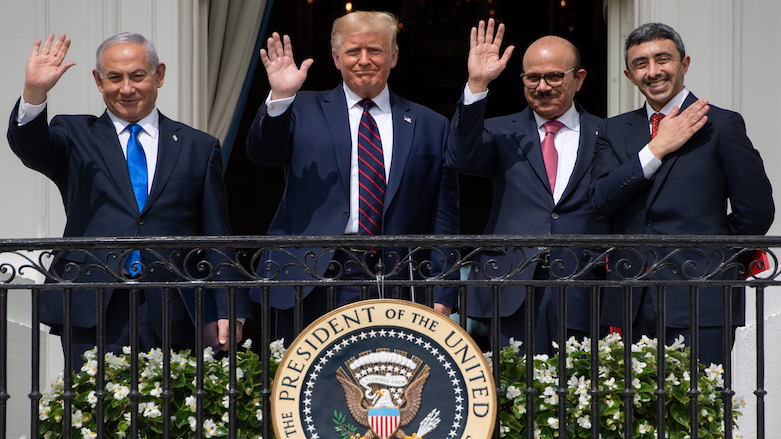Israel signs accords with UAE, Bahrain

WASHINGTON DC (Kurdistan 24) – On Tuesday, the United Arab Emirates (UAE) and Bahrain became the third and fourth Arab states to normalize ties with Israel, following Egypt in 1979 and Jordan in 1994.
Bahrain and the UAE are small states. Less than two million people live in Bahrain, and while the UAE has a population of nine million, only one million are native Emiratis.
But Riyadh’s shadow hangs over the agreements. The island nation of Bahrain, linked by a causeway to Saudi Arabia since the mid-1980s, would not have taken such a step without the tacit approval of its bigger neighbor.
Indeed, when US President Donald Trump was asked, if he thought Saudi Arabia would join the accords, he replied, “I do.”
“I spoke with the King of Saudi Arabia,” Trump continued. “At the right time, I do think they will come in.”
In any case, Riyadh has contributed to the normalization of Arab ties with Jerusalem by opening its airspace to Israeli commercial flights, and Israel has done the same regarding Saudi commercial flights.
For Israel, the Saudi opening will shave several hours off all of its commercial flights to the east. As Jared Kushner, Trump’s son-in-law and Senior Advisor, told reporters last week, “That will save people a lot of time. That knocks down a barrier that’s been up for 72 years.”
For the Arab parties, including Saudi Arabia, the deal means a strengthening of ties with Washington. The UAE expects to receive the F-35, America’s most advanced fighter jet. Turkey was supposed to buy 100 planes, but after it began to take possession of the Russian air defense, the S-400, it was removed from the program. Quite possibly, the UAE will end up as the purchaser of those planes.
Additionally, the notion developed in the 1990s that a new kind of terrorism had emerged. It was said to be different from earlier terrorism, which the US generally considered to be state-sponsored terrorism, a form of proxy war.
The new terrorism, it was said, rarely, if ever, involved state sponsorship. It was said to be a matter of ideology: Islamic extremism. The Israelis were actually the ones who came up with the concept, and they called it the “global jihad.”
Whether all such terrorism lacked state sponsorship, including even the biggest attacks—like the 1993 bombing of New York’s World Trade Center, which aimed to bring down the towers or the 9/11 assaults, which actually did—is debatable.
Read More: Revisiting Ramzi Yousef’s terrorism: World Trade Center bombing and Philippines plane bombing plot
But that perspective was adopted by elements in the US, including within the pro-Israeli community. The Saudis came to be seen as a major source of anti-American and anti-Israeli sentiment in the Middle East, if not actually sponsors of terrorism, including the 9/11 attacks. That view, however, is likely to fade, with the “Abraham Accords,” as the agreements on the normalization of Israel’s ties with Bahrain and the UAE are called.
Indeed, the emphasis on a shared heritage among Judaism, Christianity, and Islam—as implied in the phrase, “Abraham Accords”—stands in opposition to earlier attempts by some people and groups to whip up anti-Muslim sentiment in the US and elsewhere.
Arab countries generally have said little, at least so far, about the agreements, neither offering public support nor criticism. One exception is Oman, another Gulf Arab state. On Sunday, the Omani government issued a statement affirming that it “hopes this new strategic path” will “contribute to bringing about a peace based on an end to the Israeli occupation of Palestinian lands and on establishing an independent Palestinian state with East Jerusalem as its capital.”
Regional Opposition
The agreements are prompted, in significant part, by a shared hostility to Iran, and Iran has opposed them. “The oppressed and right-seeking people of Palestine and the free Muslims in the world will never approve of normalization of relations with the usurping and lawless Israeli regime,” Iran’s Foreign Ministry said in a statement issued on Saturday.
Turkey’s Foreign Ministry has similarly condemned the accords, saying they will “further encourage Israel to continue illegitimate practices toward Palestine and its efforts to make the occupation of Palestinian lands permanent.”
And as would be expected, the Palestinians have also criticized them, denouncing them as a “stab in the back,” and in a pre-dawn attack on Wednesday morning, 13 rockets were fired at southern Israel from Gaza. The Israeli Air Force responded by hitting some 10 Hamas targets there.
Thinking Outside the Box
It is a well-known axiom that if you approach a long-standing problem in the same way that it has been approached before, by others before, you are likely to end up with the same failed result.
As the renowned physicist, Albert Einstein, put it, “Insanity is doing the same thing over and over again and expecting different results.”
Over many decades, the US has spent enormous time and energy in the effort to promote peace between Israel and the Arabs. The results have been very limited.
But the Trump administration did some innovative thinking and succeeded in achieving the first concrete results in over a quarter of a century.
“We went in the back door, but I call it going in the very smart door,” is how Trump put it on Tuesday. He claimed that the Palestinians would join the diplomacy “at the right time.”
Whether that will actually happen remains to be seen, but in the meanwhile, Trump has achieved an important breakthrough that has eluded his predecessors.
Editing by Karzan Sulaivany
